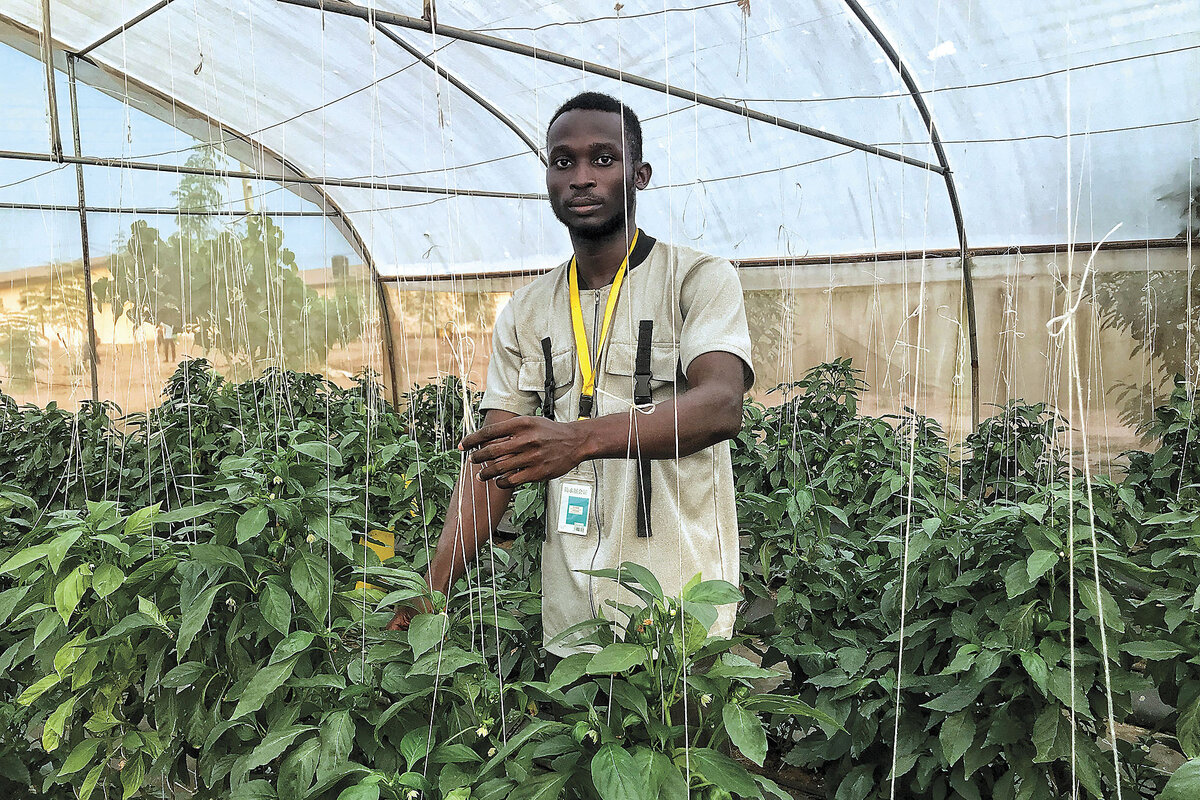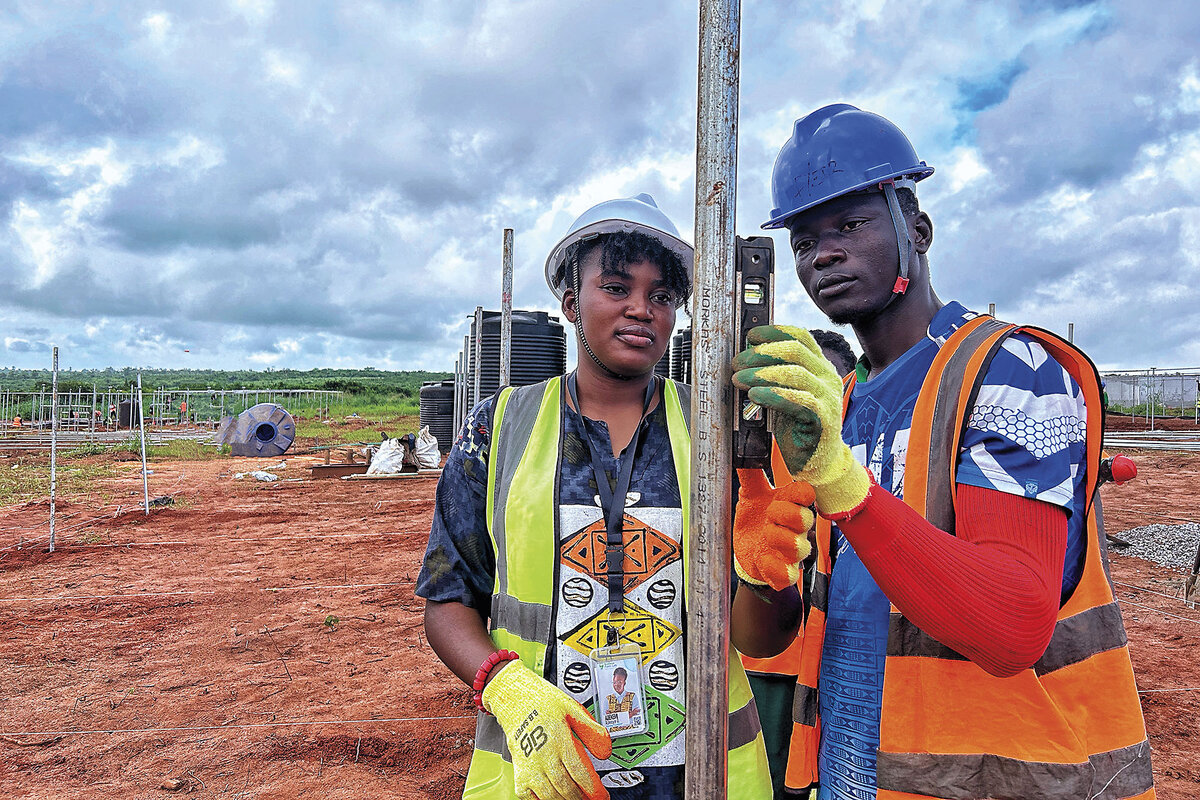A tech-savvy farmer is getting young Nigerians excited about agriculture
Loading...
| Awowo, Nigeria
The trainees’ day starts before sunrise.
Across a large stretch of open field in Nigeria’s southwestern Ogun state, young people in safety helmets, goggles, and reflective jackets are assembling frames of what will soon be net houses, a type of greenhouse. Guided by supervisors, the trainees carefully fit steel rods into holes in the red-brown earth, anchoring them in concrete. Once complete, the net-covered structures will be lined with troughs filled with rice bran and sawdust – alternatives to soil. A network of pipes and tubes will deliver fertilizer-rich water to the plants at set intervals.
No trainee is over 29 years old, and three-quarters of the cohort are women.
Why We Wrote This
A story focused onYoung people in Nigeria have long shunned careers in traditional farming. But Samson Ogbole is enticing them into the fields through hydroponics.
“We have a slogan,” says Samson Ogbole, the founder of Soilless Farm Lab, a company set on 450 acres of land. “Train a man, and you feed a family. Train a woman, and you feed a generation. We want to build something generational.”
In the afternoon, the trainees will gather for lectures on all aspects of what Mr. Ogbole calls the “vegetable value chain,” from production to distribution.
Promoting soilless farming among young people is crucial. Nigeria has the second-highest number of people facing food insecurity, behind only Congo, and the average age of its farmers is 53 years old. Soilless farming is especially important as urbanization has reduced the amount of arable land in Nigeria. It also has the potential to support a shift away from oil as the country’s leading industry.
A biochemist by training, Mr. Ogbole began his journey in agriculture unexpectedly. In late 2012, while he was fulfilling his national service requirement at the International Institute of Tropical Agriculture in Ibadan in southwestern Oyo state, his supervisors introduced him to the idea of growing yams without soil. “Because I didn’t study agriculture, it didn’t seem weird,” Mr. Ogbole says. “I thought, ‘Interesting. What’s next?’”
Since soilless farming is done in a controlled environment, it allows for multiple harvests throughout the year. Nigeria’s record-breaking heat waves last year caused devastating losses for many farmers relying on traditional methods, but farmers trained under Mr. Ogbole reported minimal impact. Their tomatoes were salvaged using pollinating hormones that helped the flowers develop into fruits, while leafy vegetables such as kale and lettuce thrived with little intervention.
Leveraging technology
In 2019, Mr. Ogbole had left his job as an agricultural consultant to start Soilless Farm Lab. The COVID-19 pandemic, which struck the following year, brought the world to a halt and hindered his company’s takeoff. He turned to Instagram, sharing tips on soilless farming. In a country where crude farming methods dominate, his unconventional approach quickly caught attention online.
As the pandemic lockdown eased, he moved the training to Soilless Farm Lab’s site. A program that brought young people to repair net houses soon evolved into the company’s signature program, Enterprise for Youth in Agriculture. Through the program, Mr. Ogbole aims to train 12,000 young people to leverage technology for vegetable production, teaching them to use artificial intelligence, for example, to automate irrigation and determine the nutrients their plants need. So far, he says 8,000 people have completed the training with support from the Mastercard Foundation.
By the end of the program, trainees get help to launch companies. Although many focus on growing produce, some have taken up roles in agricultural sales and marketing or as farm managers for food companies. “We let [trainees] know that you can be in the agricultural value chain without a farm,” Mr. Ogbole says.
Trainees have launched at least 160 companies, and he is confident that he will hit his target of 240 by year’s end. The program’s Friday mentorship sessions for trainees often focus on financial literacy.
“We want them to think about agriculture as a business,” Mr. Ogbole says. “They should be able to achieve their personal goals and provide for their families.”
Beyond changing the lives of trainees, Mr. Ogbole is “addressing some of the root causes of food insecurity in the country,” says Adebowale Onafowora, the founder of the agricultural tech company Bic Farms Concepts. He is regarded as a pioneer of soilless farming in Nigeria and was an early technical partner with Mr. Ogbole.
Outdated farming methods “are no longer sufficient with a population of over 200 million,” explains Mr. Onafowora.
“Dignifying the profession”
At conferences, Mr. Ogbole introduces himself simply as Farmer Samson.
“As an introvert, I needed an icebreaker,” he admits. He has kept the title despite spending less time tending to crops than he used to.
“Young people aren’t interested in farming because we don’t see enough role models to inspire us,” says Adekemi Adeoye, a graduate of the first training cohort. Ms. Adeoye, who earned a degree in agronomy, describes the training as a dream come true. She had always wanted to explore the agricultural sector but felt disconnected from the traditional farming practice of using a hoe and a machete for clearing land for planting.
“Farmer Samson is the prototype for many of us,” she says. After completing the program, she stayed on as a training facilitator.
Mr. Ogbole is “dignifying the profession, making young people proud to be farmers,” says Mr. Onafowora.
Trainee Theophilus Williams co-founded Itana Farms and describes Soilless Farm Lab as “a land of opportunities.” He recalls his early struggle to secure grants, but says he found motivation in one of Mr. Ogbole’s mantras about money: “In agriculture, we don’t blow; we grow.” Mr. Williams and his team eventually won a grant and an acre of land to kick-start their work.
Shifting trainees’ mindsets to believe in soilless farming is a tough challenge, Mr. Ogbole says. But he notes a positive trend. “With every new cohort, more choose to remain in the [farming] space.”
“Young people want the truth,” he adds. “I show them that there will be hiccups along the way.” In Soilless Farm Lab’s first year, for example, Mr. Ogbole farmed in rented greenhouses, leaving him heavily in debt.
“Buying good land in Nigeria is not easy,” notes Mr. Onafowora, citing high costs and complex land laws.
To give program graduates a head start, Mr. Ogbole provides them with seeds and a small plot of land at Soilless Farm Lab’s site. After harvest, he acts as an offtaker, selling the produce to his established buyer network and giving trainees the majority of the profits.
Outside the lecture hall, Mr. Ogbole stops to greet a group of trainees. Smiles spread across their tired faces, and a few step forward, eager to have a conversation. Mr. Ogbole does not hesitate.
Occasionally, he scrolls through his robust Facebook following to check how many of his acolytes have adopted “farmer” as a title, signaling their greener transformation.
“It might sound funny,” he says with a chuckle, “but this is the change for me.”







